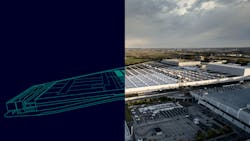Siemens and Mercedes-Benz Co-Develop Digital Energy Twin
To support Mercedes-Benz’s goal to have all of its fully-owned production sites operating on 100% renewable energies by 2039, the company has been working with Siemens to develop a digital energy twin that reportedly enhances, simplifies and speeds the early phase factory energy planning process for both brownfield and greenfield sites.
This digital energy twin collaboration combines the decarbonization and energy twin domain know-how of Siemens with the automotive knowledge of Mercedes-Benz to create a scalable tool for the automotive environment. It was designed and tested in Mercedes-Benz plant in Sindelfingen, Germany.
Siemens and Mercedes Benz established a strategic partnership in 2021 for sustainable automotive production, enabling cooperation on advancing the digitalization of sustainable production methods. For this new digital energy twin, Siemens will provide training and support, and maintain and continuously develop the digital energy twin as it is implemented across the Mercedes-Benz global production network.
Based on behavioral models of buildings, technical equipment and energy generation, this digital energy twin connects inputs such as weather data, load profile simulation, building asset selection and dimensioning. Simulating a physical energy system, it verifies proposed planning scenarios for energy use, providing recommendations on how to optimize desired outcomes including energy efficiency and associated cost savings, as well as emissions reduction.
“The digital energy twin is our answer to successfully visualize, analyze and sustainably optimize energy-efficient building processes,” said Arno van der Merwe, vice president of production planning for Mercedes-Benz cars. “Through this innovative approach, we benefit from a better understanding of existing factory buildings and can transform them into living smart buildings.”
Siemens also recently announced that it is working with another international partner for its global Net Zero Production roadmap, using a digital energy twin to simulate energy use and identify where energy savings could be made at 15 breweries worldwide. Siemens estimates that energy savings of between 15-20% are achievable at each site, with an average CO₂ reduction of 50% per site.

